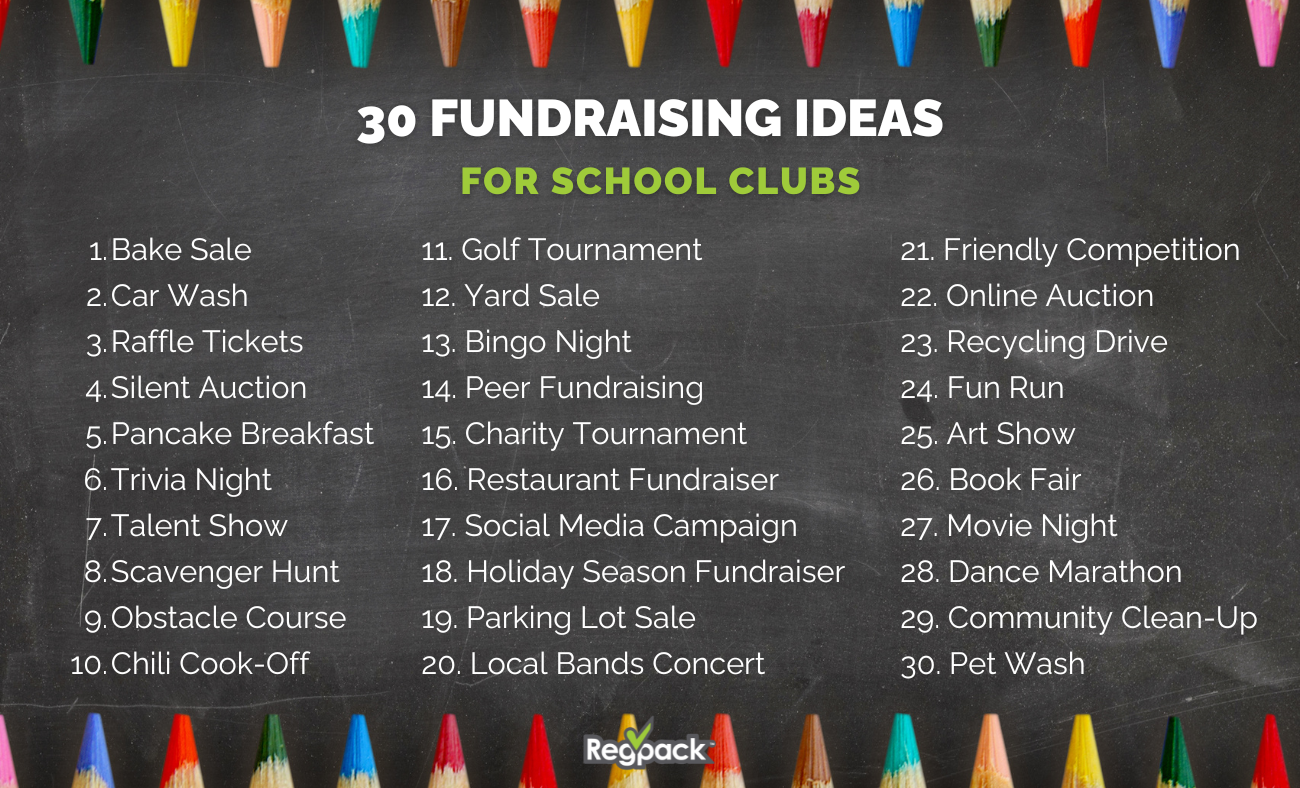School clubs enrich students’ lives by providing opportunities to explore their passions and develop new skills. However, these clubs often require additional funds to support their activities. To meet their financial goals, students and teachers frequently organize fundraisers. Planning and coming up with effective fundraising ideas can be challenging, but it’s essential for the success of these clubs.
The best school fundraisers are creative, fun to host, and easy to participate in. Whether you’re investing in resources for your student organizations or funding a trip for one of your clubs, fundraising is a vital part of enhancing students’ opportunities. However, developing fundraising ideas that excite both students and their parents can be difficult.
If your past fundraisers haven’t always resonated with participants and attendees, , you may not have chosen the right type of event. Ideally, fundraising ideas for school clubs should be engaging for both student participants and adult supporters. This balance is key to executing a fundraiser that excites participants and raises revenue.
Here are 30 of the best fundraising ideas for school clubs that are sure to get students excited about raising money!

1. Bake Sale
Organize a bake sale where club members and parents contribute homemade baked goods. Set up a booth at a local event or school function to sell the treats. Promote the bake sale through flyers and social media platforms to attract customers.
2. Car Wash
Host a car wash in the school parking lot. Charge a small fee for each car washed and recruit volunteers to help with the event. Offer additional services like interior cleaning for extra money.
3. Raffle Tickets
Sell raffle tickets for a chance to win donated prizes from local businesses. This is a great way to engage community members and raise funds. Announce the winners at a school event to create excitement.
4. Silent Auction
Organize a silent auction with items donated by local businesses and community members. Display the items at a school event and allow attendees to place bids. Use an online platform to allow remote bidding and increase participation.
5. Pancake Breakfast
Host a pancake breakfast at the school or a local community center. Charge an entry fee and recruit volunteers to help cook and serve the food. Offer a variety of toppings to make the breakfast more fun!
6. Trivia Night
Plan a trivia night at the school or a local restaurant. Charge admission and offer prizes for the winning teams. Create themed rounds to make the event more engaging and fun.
7. Talent Show
Organize a talent show featuring performances by students and local bands. Charge an admission fee and sell refreshments during the event. Invite local celebrities to judge the performances and attract a larger audience.
8. Scavenger Hunt

Create a scavenger hunt around the school or local park. Charge a registration fee for participants and offer prizes for the winners. Incorporate educational clues to make the hunt both fun and informative.
9. Obstacle Course
Set up an obstacle course in the school gym or local park. Charge an entry fee for participants and offer prizes for the fastest times. Include different difficulty levels to cater to all age groups.
10. Chili Cook-Off
Host a chili cook-off where participants pay an entry fee to compete. Charge admission for attendees to taste and vote on their favorite chili. Offer a trophy or ribbon for the best chili to encourage participation.
11. Golf Tournament
Organize a charity golf tournament at a local golf course. Charge a registration fee for teams and seek sponsorships from local businesses. Provide lunch and refreshments to make the event more enjoyable.
12. Yard Sale
Hold a yard sale where club members and community members donate items to sell. Set up the sale in the school parking lot or a local park. Advertise the sale in local newspapers and online platforms to attract more buyers.
13. Bingo Night

Plan a bingo night at the school or a local community center. Charge admission and offer prizes for the winners. Sell snacks and drinks to raise additional funds.
14. Peer Fundraising
Encourage club members to set up individual fundraising pages on an online platform. They can share their pages on social media to collect donations from friends and family. Offer incentives for the top fundraisers to motivate participation.
15. Charity Tournament
Organize a sports tournament, such as a basketball or soccer tournament. Charge a registration fee for teams and sell tickets to spectators. Provide medals or trophies for the winning teams to add prestige to the event.
16. Local Restaurant Fundraiser
Partner with a local restaurant to host a fundraising night. A portion of the proceeds from the evening’s sales will go to your club. Promote the event through flyers and social media to ensure a good turnout.
17. Social Media Campaign
Launch a social media campaign to raise awareness and funds for your club. Use platforms like Facebook, Instagram, and Twitter to reach a wider audience. Create engaging content and use hashtags to increase visibility.
18. Holiday Season Fundraiser
Plan a holiday-themed fundraiser, such as a gift-wrapping service or holiday craft fair. Charge a small fee for each service or item sold. Decorate the venue to create a festive atmosphere and attract more participants.
19. Parking Lot Sale
Host a sale in the school parking lot where community members can rent spaces to sell their items. Charge a fee for each space rented. Offer refreshments and entertainment to make the event more appealing.
20. Local Bands Concert
Organize a concert featuring local bands. Charge admission and sell refreshments during the event. Set up a merchandise table where bands can sell their CDs and T-shirts, with a portion of the proceeds going to your club.
21. Friendly Competition
Host a friendly competition, such as a spelling bee or talent contest. Charge an entry fee for participants and sell tickets to spectators. Offer prizes for the winners to encourage participation.
22. Online Auction
Set up an online auction where community members can bid on donated items. Promote the auction on social media and through email campaigns. Use an online platform to make the bidding process easy and accessible.
23. Recycling Drive
Encourage students and staff to bring in recyclable goods from home. Collect and sell the recyclables to raise funds for your club. Partner with a local recycling center to ensure proper disposal and maximize profits.
24. Fun Run

Organize a fun run where participants pay a registration fee to run a set course. Offer prizes for the fastest times and best costumes. Provide water stations and snacks to keep participants energized.
25. Art Show
Host an art show featuring works by students and local artists. Charge admission and sell the artwork to raise funds. Offer art classes or workshops during the event to attract more attendees.
26. Book Fair
Partner with a book company to host a book fair at the school. A portion of the sales will go to your club. Invite local authors for book signings to draw more visitors.
27. Movie Night
Plan a movie night at the school. Charge admission and sell popcorn and drinks during the event. Choose a popular or classic movie to attract a larger audience.
28. Dance Marathon
Organize a dance marathon where participants collect pledges for each hour they dance. Offer prizes for the last dancers standing. Provide a DJ and refreshments to keep the energy high.
29. Community Clean-Up
Organize a community clean-up event. Participants can collect pledges for each bag of trash they collect. Partner with local businesses to provide supplies and refreshments for volunteers.
30. Pet Wash
Host a pet wash event where community members can bring their pets for a wash. Charge a fee for each pet washed and recruit volunteers to help. Offer additional services like nail trimming or grooming for extra funds.
How Regpack Can Help
Regpack is an online registration and payment software that can help simplify your club’s fundraising efforts.
With Regpack, you can easily register participants for events, collect payments, and manage your fundraising events all in one place.
Our user-friendly platform allows you to focus on planning and executing successful fundraisers while ensuring a smooth and efficient registration process.
By using Regpack, your school club can maximize its fundraising potential and achieve its financial goals!
For additional information on how our registration software can benefit your school clubs, read our page on School Club Registration Software














